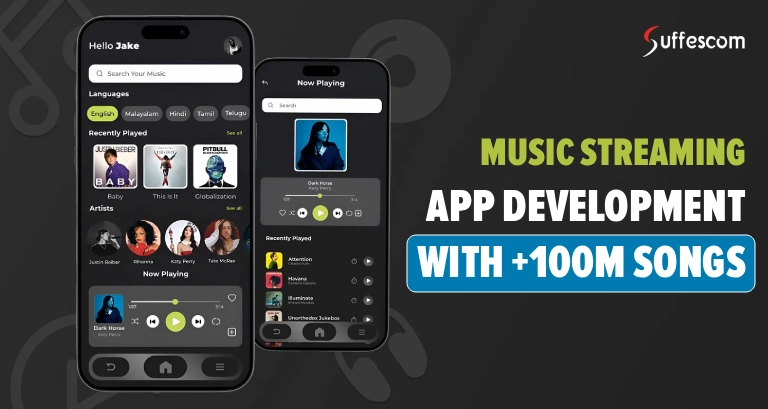Mood Tracking App Development: Launch Your Own Emotional Wellness Platform

Mood Tracking App Development
Just like physical health, mental health has been a primary concern throughout the world. Since people are battling with their mood swings, which adversely affect their psychological and physical health. With continuous fluctuations in mood, the demand for mood tracker applications is rising. These applications are a comforting companion, helping individuals track their moods daily. The growing attention towards mood-tracking apps is a testament to their relief and support, prompting entrepreneurs and investors to invest in their development.
But what's the reason behind such market growth? How do such applications serve users with better mental health? What are the benefits of mood tracking apps? Let's elaborate!
Mood Tracking App Development Service
"Our mood tracking app development service offers a personalized experience to help users monitor and improve their mental well-being. With intuitive design, seamless integration, and real-time analytics, we create apps that empower users to track emotions and gain valuable insights.
Reasons Why Mood Tracker App Development Apps Are in Trend?
The World Health Organization (WHO) has portrayed mental health as a natural state of well-being. If anyone realizes their potential to deal with the day-to-day stresses of life, they can work effectively and contribute to their community. Due to the scarcity of mental health awareness, the risk of becoming sick from disorders such as cardiovascular disease and diabetes is rising.
Progressive Lifestyle
Mood-tracking apps are not just tools for tracking moods but are also instrumental in promoting a progressive lifestyle. By tracking users' moods and storing long-term records, these apps help identify trends and triggers, facilitating the initiation of positive lifestyle changes. They also help users assess their success in managing their mood, ensuring continuous improvement in their lifestyle.
Better Control Over Mood
When we're grappling with a bad mood, it can be challenging to focus on tasks. This can gradually affect our daily goals and decision-making. A mood-tracking app, however, empowers us by allowing us to establish a long-term mood record and quickly identify patterns and triggers. This newfound control over our emotions can significantly improve our mental well-being.
Health Awareness
Nowadays, people are more concerned about their physical and mental health. They invest more time in practicing meditation and other peaceful activities that can calm their minds and souls. They are also more aware of their mood swings and consult medical professionals if they feel destructive emotions are consuming their lives.
Poor Healthcare Options
Another reason behind the growing number of people relishing the benefits of mood tracker apps is the need for proper health care options. In various cases, the healthcare professionals are overburdened. Thus, they pay more attention to serious and critical health problems if you visit them. The use of mood tracker apps, in this situation, helps users bridge the gap between healthcare practitioners and patients by providing a way to track and analyze their mood fluctuations. Later on, it allows specialists to examine users' past mood swings and offer them the proper guidance and treatment for better mental health.
How Will a Mood Tracker App Work?
Let's explore how a mood-tracking app can benefit your users, enhance and support your overall well-being, and give you the confidence to invest in such apps.
User Setup
Users initiate their journey with mood-tracking apps by digitally creating profiles. During the setup, individuals customize various parameters vital for accurate mood tracking. Mood-tracking apps recognize feelings ranging from positive to negative, providing a baseline for users to express their feelings. Users need to input their height and weight to tailor the app according to the user's mental health objectives. This initial configuration is the foundation of a tailored mood-tracking experience, enabling users to track their emotional journey effectively.
Data Input
Once the user setup is complete, individuals regularly engage with the app by logging their daily mood and habits. Mood tracking apps commonly feature simple interfaces that prompt users to select their emotional state from a predefined list of emotions. This streamlined process encourages consistent participation, making it easy for users to incorporate mood tracking into their daily routines. Beyond mood logging, users may input additional data points such as sleep patterns, physical activity, and noteworthy life events. Providing more accurate data influences an individual's emotional well-being.
Contextual Information
Mood tracking apps go beyond essential mood input by promoting users to provide contextual information. Users must input their sleep patterns and physical activity, vital in understanding the broader context of an individual's emotional states. Considering such activities and external aspects, these apps contribute to a more thorough analysis, providing a deeper understanding of the user's emotional state. This contextual information improves the app's ability to identify patterns and correlations between external factors and mood fluctuations, offering users a more authentic perspective on their mental well-being.
Customizable Features
Many apps offer customizable features to improve user engagement and promote consistent mood-tracking facilities. These may include reminders to log moods at specific times, reflection prompts to facilitate users' thinking about their day, and motivational messages to keep users engaged. These features are tailored to the user's preferences and can be modified or turned off if they feel unwanted. Customizing these features helps users shape their experiences and empowers users to align the app according to their unique preferences and goals.
Data Analysis
Mood-tracking apps leverage advanced technologies such as data analytics and, in some cases, machine learning algorithms. These tools analyze the accumulated data to identify patterns, trends, and potential triggers affecting users' emotional states. This analytical process allows the app to adapt and evolve, refining its capability to provide personalized recommendations and predictions based on the user's historical data.
Self-awareness and Decision-making
Ultimately, the primary goal of mood-tracking apps is to empower users with self-awareness to make informed decisions regarding their mental health. With a wealth of insights from continuous mood tracking, users can make informed choices to improve their health and well-being.
Choose The Right Mood Tracker Apps To Develop
Manual Mood Tracker Apps
These apps offer users a medium to examine their mood swings. They would have graphical representations, set reminders, and activities to enhance mood by talking, playing meaningful games, and listening to music. As a leading mobile app development company, we work rigorously to enhance the app’s user experience and functionalities.
Automated Mood Tracker With Wearables
These apps are progressives of manual mood tracking applications. They run with automated accumulation of the required information. These apps use wearable devices to observe users' psychological responses, such as breathing range and blood sugar level, etc. The app uses previous data to create graphical data that allows users to learn about their improvements in mental conditions and what's going on in their minds and bodies.
Integration of Such Features with Wearables are:
- Sync with Google Fit or Other Fitness Apps
- Spo2 Monitor
- Sleep Monitor
- Stress Monitor
- Heart Rate Monitor
Features to Have in Your Mood Tracker App Development
User’s App
Mood Diary
The mood-tracking app will let users feed information about their feelings throughout the day as if we write our memories and daily updates into a diary. Various applications ask different sets of detailed questions, which helps users better understand their emotional state, how long they remained in that state, and more.
Mood Chart
Since visual content aids users in understanding and analyzing their complex information quickly and effortlessly, the mood tracking apps would also have a mood chart feature. This feature concludes graphs and charts using different proportions, which makes it more comfortable for users to focus on any particular time or place and get a clear picture of their emotional state.
Health CheckUps and Diagnosis
This feature lets users and medical specialists monitor health conditions earlier and get detailed information on their progress in the field of depression, anxiety, and other disorders.
Integration With Wearables
Your app requires wearable device integration to meet customers' needs. This would help users figure out heart and pulse rates and several other things that will help them keep track of their health. You can also provide your users with app tools that let them see how their thought patterns cause stress and anxiety.
Community Support
When it comes to mood-tracking apps, the feature of community support is indispensable. This feature allows users to connect with others globally, fostering a sense of community among those fighting similar psychological issues. The support and understanding within these communities can significantly improve mental health by helping users adopt new habits or simply being there to navigate emotional and stressful situations.
Social Media Integration
Social media integration is vital for your app's success in the market. Mood-tracking apps let users efficiently share their data with doctors and others, allowing experts to collect and analyze their emotional level in real-time and devise a better plan to fight depression and other conditions.
Integration of AI and ML
While developing the mood tracking app, you can use emerging technologies like machine learning (ML) and artificial intelligence (AI). These technologies will help users understand the analytics and the impact of various factors on their moods. Moreover, using such technologies can help find the best techniques to lift an individual's Mood or cheer up a user based on personalized recommendations and preferences.
Admin Panel
In a mood tracker app development, the admin panel is not just a tool, but a source of empowerment for app administrators, enabling them to successfully operate the app's functionality and manage user data with responsibility and control.
Dashboard
The admin will have a summary of key metrics like the number of active users, average mood ratings, and recent activity. They can also access charts and graphs showing mood trends, user engagement, and other relevant data.
User Management
Admins can view and manage user accounts, including personal details, mood logs, and activity history. This includes adding or removing users, updating their personal information, and viewing their mood records and activity history. They can also modify user roles and permissions if the app helps multiple roles (e.g., regular users vs. therapists or coaches), ensuring each user has access and control.
Content Management
Admins can manage educational content, such as articles, tips, and advice related to mental health. They can also configure and send users notifications or alerts about app updates, suggestions, or reminders.
Data Analytics
Admins can generate detailed reports on user activity, mood trends, and app performance. These reports provide valuable insights that can help admins make informed decisions to improve user engagement and app functionality, making them feel strategic and well-informed.
Settings and Configuration
Admins can adjust the app's functionality settings, such as mood tracking parameters, user interface options, and integration with other tools or services. They also manage security settings, including data encryption, user authentication methods, and privacy policies.
Feedback and Support
Admins play a crucial role in managing user feedback or support requests. Tracking and addressing bug reports or issues that users encounter can ensure a responsive and connected user experience, making them feel integral to the app's success.
Data Management
Admins can manage data export and import functions for backups or migration purposes and oversee database maintenance and optimization.
User Engagement
Admins can implement strategies to enhance user engagement, such as personalized messages, rewards for consistent tracking, or new feature announcements.
How To Create A Mood Tracking App?
Welcome To The Captivating World of Our Mood Tracker App
Welcome to the captivating world of our Mood Tracker App, where you can effortlessly monitor your emotions, gain insights, and enhance your mental well-being. Start your journey to a balanced, healthier you today!
It would be a tricky question, yet we conclude the answer! If you are considering building a mood-tracking app, consider a few things before development. First, you must discover if your application will be helpful to others and if they would use it regularly. This can only be done through research and some market indicators. Focusing on the most critical functions is highly recommended without overloading your app with non-essential features.
Audience Research
Research and user feedback are crucial in developing a mood and activity tracking app. They help you plan and ensure that your app meets users' needs. By gathering user feedback, such as the difficulties they face, you can make informed decisions about the practicality and effectiveness of your app.
Specification
The next step is to plan where you want your application to be published and what features it would have. It is a crucial step as it will help you decide if the app will be valuable and is worth all the time and resources required for its creation. Remember, you don't jump and finalize the specification in a rush. It will help you think about how many people will use your application in the beginning and make informed decisions later on.
Hiring an App Development Company
Once you have finished planning and wrapping up feature requirements, the next step is to find the right company to develop your functional app. You must search for companies that are well-recognised for providing mood-tracking, mental health, wellness, and anger management app development services. Suffescom is one of those leading mobile app development companies with whom you can connect to develop a robust mood-tracking app.
Development Process
The app development process may take a few weeks or months, depending on its overall complexity and the experienced professionals you have hired to create it. Before letting a developer begin working on your app, it's good to let them know how you want it to be in the initial stages. This can help you keep things under control, and developers can avoid unnecessary features that will waste time and money.
Product Launch
Once you have finished the app's development process, it is time to launch the product and spread awareness to others who could use it. You should be prepared for criticism to try to make modifications if something is wrong with the app. It would be best if you were also ready for people who may want specific features added, which means more work on your part and more costs.
What are The Business Models of Mood Tracking Apps?
In-app Ads
One of the most accessible options for monetizing your app is in-app advertising. It is too simple: You just have to showcase a third-party advertisement in your app interface. The third-party partner will share your rewards according to one-click, views, and conversions.
Sponsorships
Partnerships with credible healthcare and wellness groups would be the best options for making money from your activity and mood-tracking app. You will get handsome value in exchange for your full-functional application.
In-app Purchase
Last but not least, in-app purchases are also one of the best ways to make real profits via mood-tracking applications. It is one of the ideal business revenue models for reaping benefits from considering resources while targeting advancements. Entrepreneurs earn money in return for using mood tracker apps' exceptional features, like buying advanced features such as new emojis, stickers, consolidated insights into their monthly and annual records, and much more.
Subscription
Some subscription plans allow users to enjoy additional features in the application, such as talking with experts on chat and audio and video calls. These features are only available for subscribed users. The self-awareness cultivated through mood-tracking apps empowers individuals to take an active role in managing their mental health.
Mood Tracker App Solutions For Mental Health Management
Our Mood Tracker App solutions are designed to support mental health management by helping users track emotions, identify patterns, and gain insights, leading to a more balanced and healthier life.
Cost of Mood Tracker App Development
Now that you have a lot of information about the mood tracking app, it must be clear that all apps have different features or business models. Each app is unique; thus, one size doesn’t work for all.
The cost of developing a mood-tracking application depends on various factors. These include the features you want to add to your app, the required tech stack, and your target platforms. So, it is daunting to provide the exact cost of development. In such a scenario, it is advisable to avoid falling for the company offering a fixed-value cost of developing a mood-tracking app. You must look ahead to determine the cost-affecting factors and get an estimate. Following this, you can have an idea of developing a mood tracker app. Now that we know all about mood-tracking app development costs, let's look into the business revenue models to cover at least operational costs after the launch.
However, the average cost of developing a mood-tracking app ranges from $20,000 to $40,000. If you would like to know the exact price, please get in touch with our business team.
Why Hire Suffescom to Develop Mood Tracker App?
With years of experience developing mobile apps, we can help you create any mobile application you want us to develop for your business. There are many mobile app development companies worldwide, but what sets us apart is that we only work on providing value to our clients. We also specialize in blockchain, AI/ML, react JS, and Flutter technologies. Our dedicated team can assist you with all your app development needs, from planning to implementation and testing to deployment. With almost 500+ professionals working day and night, we are confident enough to make small start-ups stand out in the market. Since we work well with your business requirements, we fit them into our objectives and goals. We don't just build apps; we build lifelong connections.







